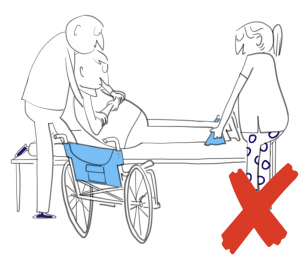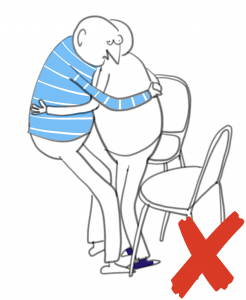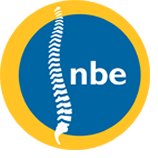Training
 Manual Handling legislation requires all employees to have adequate manual handling training which needs to be refreshed on a regular basis.
Manual Handling legislation requires all employees to have adequate manual handling training which needs to be refreshed on a regular basis.
The dynamic, fun relevant courses offered by Positive Positioning will perfectly equip your employees with the knowledge and skills needed to comply with these obligations.
Courses are delivered in modules that are tailored to meet the specific needs of your workforce. It is important that we chat to you and fully understand the manual handling tasks undertaken in your workplace(s).
Courses offered
- Introduction to safer handling of people for new staff
- Safer handling of people updates
- Train the trainers in safer handling of people
- Train the trainer updates
- The safe use of hoists and slings
- Training of carers / family members / personal assistants in person’s own home
Core learning outcomes for all safer handling courses
- Be able to define manual handling and explain the common causes of injury.
- Understand the legal responsibilities and the duties placed on employers and employees.
- Understand the types of injury that can be caused by poor manual handling practice.
- Be able to undertake an effective manual handling risk assessment by being able to recognise manual handling hazards.
- Understand the control measures that can be put in place to reduce the risk of harm.
- Understand and practice the best way to handle loads to maintain a safe working environment.
All courses are divided into accessible, interactive modules with practical elements to meet the specific needs of the organisation and participants.
Participants are assessed with continuous observations. There is no final exam.
- Introduction and Legislation – what is manual handling? Causes of injury, benefits of controlling risks, manual handling legislation, employer and employee duties and HSE guidance.

- Identifying the Risks – types of injury, occupations most at risk, the musculoskeletal system, the mechanics of movement and factors that increase the risk of harm.
- Risk Assessments – what is a risk assessment? Identifying task, load and environmental hazards, deciding who may be harmed, evaluating risks, recording findings and reviewing and updating.
- Reducing and Controlling the Risks – preparing a manual handling operation, individual capacity, can manual handling be avoided? Reducing the risk of harm, mechanical aids, changing the task, load and environment, personal protective equipment and reducing the risks from team handling.
- Manual Handling Techniques – assisting people to move, pushing wheelchairs, use of the equipment you may see in your work place including hoists, slings, slide sheets, stand aids etc.
After training we are available for on-going support to answer your questions.
Consultancy
Our highly qualified team are available to come and provide in-depth analysis and recommendations to assist with your complex people handling situations.
Our services include
- Complex manual handling assessment and plans for individuals with more challenging handling needs
- Creating training programmes for the organisation and on-going support of staff to ensure effective risk reduction
- Advice on specific equipment suitable for your needs and your budget
Testimonials




